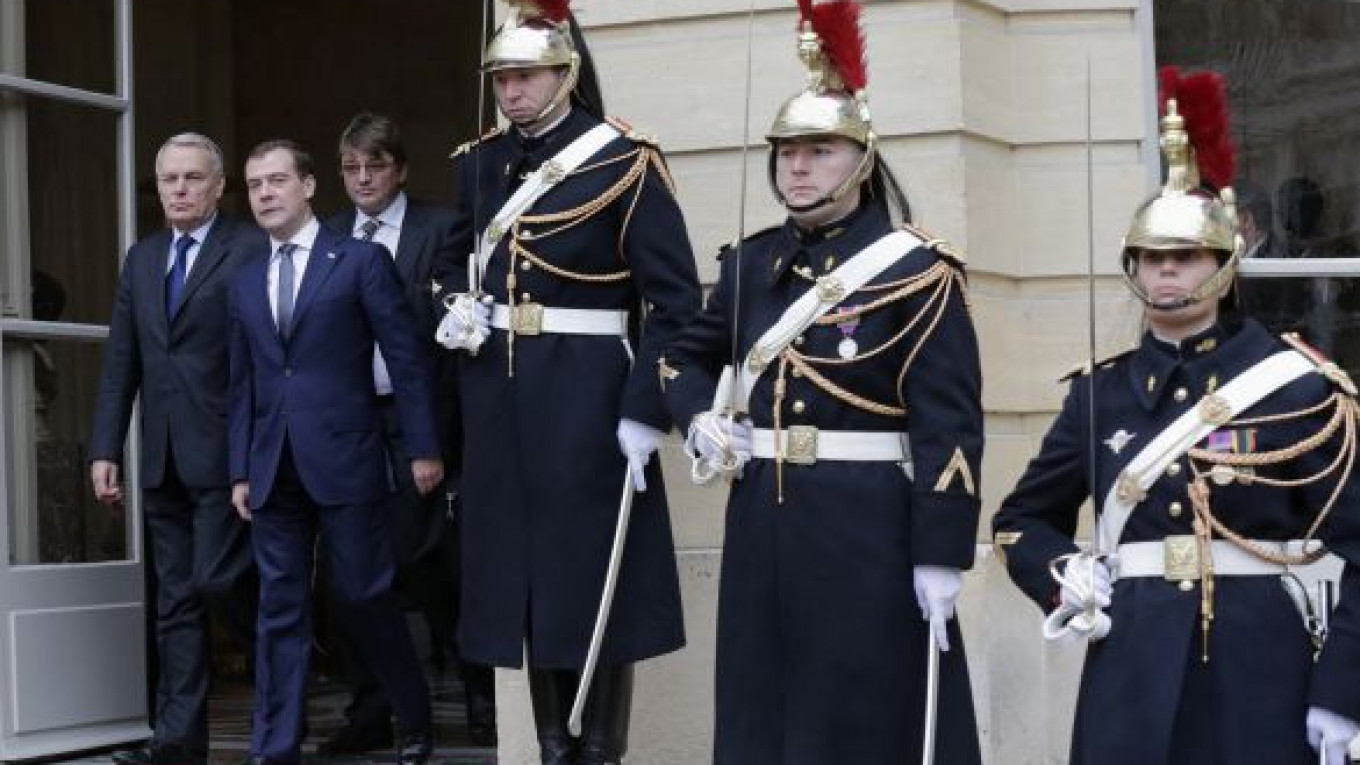A protocol to establish the Business Cooperation Council was signed at a meeting of Prime Minister Dmitry Medvedev with French businessmen, which took place during his visit to Paris. The council's goal is to promote economic cooperation and generate new ideas on developing business ties, according to a statement published on the government website.
The functions of the new organization will include stimulating mutual investment, developing contacts between business and senior government officials, and advising on the measures to improve Russia's investment climate, said Geraldine Lemble-Pavlov, deputy chairman of the MEDEF International, a business lobby group.
MEDEF started the council jointly with the Russian Union of Industrialists and Entrepreneurs.
The organization will include representatives of Russian and French companies. It will be chaired by chief executive of Russian Railways Vladimir Yakunin and chief executive of aerospace company Arianespace Jean-Yves Lee Gall.
Yakunin — who is also co-chairman of the French-Russian Dialogue, an association with broader functions — said the Business Cooperation Council will focus specifically on strengthening the countries' economic ties. The first meeting of the group is expected to take place sometime in the next few months, he said.
Medvedev, who also met with his counterpart, Prime Minister Jean-Marc Ayrault and French President Francois Hollande, pushed for expanding Russia's cooperation with France, since a solid base for it already exists. The size of French investment into Russia's economy has reached nearly $10 billion, he said, according to the government website. ?
French companies are interested in cooperation with Russia, so the most common questions posed to Medvedev were about the government's priorities, said Lemble-Pavlov, who was present at the meeting with business leaders. She added that French businessmen showed interest in Russia's plans to develop high-speed railways, as well as the prospects of the country's energy industry.
The French business community also welcomed Russia's accession to the World Trade Organization — a move that Medvedev said would provide "good opportunities for cooperation with foreign partners, and France in particular." ?
Russia became a full-fledged WTO member in August, having brought the curtain down on its 18-year effort to join the global trade club. But EU officials again this week criticized some of the measures the country has introduced to support local manufacturers, following WTO-mandated decreases in import duties.
An unidentified EU official said that a ban imposed by Russia in March on the import of pigs for slaughter and the introduction of a recycling fee for imported cars that went into effect in September discriminate against importers and are against WTO rules, Reuters reported earlier this week.
? The official, who spoke at a meeting of the WTO's Goods Council, said consultations with Russia are under way to resolve the controversial issues.
Japan and the United States joined the EU during the meeting in criticizing Russia's policy, the report said.
Resolving numerous disputes is routine work for the WTO, as many of its members are trying to protect their manufacturers, said Alexei Portansky, a professor in the global economy and policy department at the Higher School of Economics in Moscow. The reason for the fuss around Russia is that it's a new member of the trade club, he said by telephone.
For the European Union to push the dispute forward, it needs to submit an official claim, and if peaceful consultations don't bring a result, the Dispute Settlement Body will review the dispute, Portansky said.
Medvedev said Russia is facing "an uneasy period of getting used" to WTO rules.
"We'll of course be focused on our priorities and follow the rules set at the World Trade Organization," he said, adding that the country's next goal is to join the Organization for Economic Cooperation and Development.
During Medvedev's visit to France the two countries signed several documents, including a shareholder agreement between Peugeot-Citroen and Russian Railways, which is buying 75 percent of logistics company GEFCO from the French car manufacturer.
"The deal is to support GEFCO group's position in international markets thanks to growing into new destinations," and it will provide Russian Railways access to "state-of the art logistics technologies," the railway giant said in a statement Tuesday.
The contract formalizing the stake transfer for 800 million euros was signed earlier this month.
Related articles:
A Message from The Moscow Times:
Dear readers,
We are facing unprecedented challenges. Russia's Prosecutor General's Office has designated The Moscow Times as an "undesirable" organization, criminalizing our work and putting our staff at risk of prosecution. This follows our earlier unjust labeling as a "foreign agent."
These actions are direct attempts to silence independent journalism in Russia. The authorities claim our work "discredits the decisions of the Russian leadership." We see things differently: we strive to provide accurate, unbiased reporting on Russia.
We, the journalists of The Moscow Times, refuse to be silenced. But to continue our work, we need your help.
Your support, no matter how small, makes a world of difference. If you can, please support us monthly starting from just $2. It's quick to set up, and every contribution makes a significant impact.
By supporting The Moscow Times, you're defending open, independent journalism in the face of repression. Thank you for standing with us.
Remind me later.


